This research will address whether and how the coronavirus pandemic exacerbates barriers to gender parity in developing countries by asymmetrically affecting time use for men and women. The effects of COVID-19 are likely to differ by gender (Alon et al., 2020), but the nature and extent of those differences are uncertain. The study, therefore, proposes the collection and creation of a novel dataset, based on a short survey combined with web browsing histories of individuals from India and Kenya, to empirically assess the differential effects of COVID-19 on time use by gender.
Women traditionally bear a greater responsibility for childcare and home production, for both cultural and economic reasons. The study, therefore, hypothesizes that the outbreak, and associated closures to schools and businesses, will present a larger shock to the time budgets of women and tend to disproportionately increase their unpaid work and dampen their work productivity. At the same time, the pandemic can cause demand shocks that differ by gender because of occupational sex segregation. Women tend to be highly represented in essential service sector jobs that need to be performed onsite (Gupta 2020, Robertson and Gebellof 2020), which would imply a smaller change in time use during work hours, but possibly larger shifts in time outside of paid work. The study, therefore, expects the gendered effects to differ based on the work status and occupation of the adults in the household, which they will examine with data from our survey. They will also assess whether investments-to-self–such as job search and skills development –are differentially affected by the pandemic for men and women. Our results can help assess the impact of the pandemic on gender parity and point to areas for potential policy intervention.
